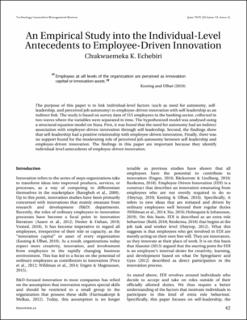| dc.contributor.author | Echebiri, Chukwuemeka | |
| dc.date.accessioned | 2021-02-02T13:13:59Z | |
| dc.date.available | 2021-02-02T13:13:59Z | |
| dc.date.created | 2020-06-27T11:11:22Z | |
| dc.date.issued | 2020 | |
| dc.identifier.citation | Technology innovation management review. 2020, 10 (6), 41-51. | en_US |
| dc.identifier.issn | 1927-0321 | |
| dc.identifier.uri | https://hdl.handle.net/11250/2725834 | |
| dc.description | Publish under a Creative Commons Attribution 3.0 License. | en_US |
| dc.description.abstract | The purpose of this paper is to link individual-level factors (such as need for autonomy, selfleadership, and perceived job autonomy) to employee-driven innovation with self-leadership as an
indirect link. The study is based on survey data of 315 employees in the banking sector, collected in
two waves where the variables were separated in time. The hypothesized model was analysed using
a structural equation model on Stata. First, it was found that the need for autonomy had an indirect
association with employee-driven innovation through self-leadership. Second, the findings show
that self-leadership had a positive relationship with employee-driven innovation. Finally, there was no support found for the moderating role of perceived job autonomy between self-leadership and employee-driven innovation. The findings in this paper are important because they identify individual-level antecedents of employee-driven innovation. | en_US |
| dc.language.iso | eng | en_US |
| dc.title | An empirical study into the individual-level antecedents to employee-driven innovation | en_US |
| dc.type | Peer reviewed | en_US |
| dc.type | Journal article | en_US |
| dc.description.version | publishedVersion | en_US |
| dc.source.pagenumber | 41-51 | en_US |
| dc.source.volume | 10 | en_US |
| dc.source.journal | Technology innovation management review | en_US |
| dc.source.issue | 6 | en_US |
| dc.identifier.doi | 10.22215/timreview/1367 | |
| dc.identifier.cristin | 1817383 | |
| cristin.ispublished | true | |
| cristin.fulltext | original | |
| cristin.qualitycode | 1 | |
